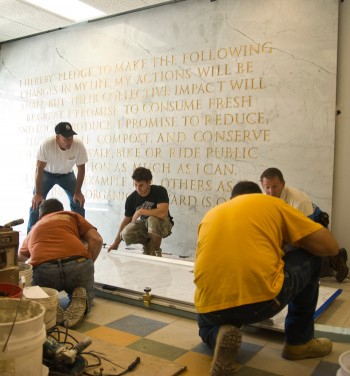Build a “Climate SmART” Community
| Be “climate smART.” Get the facts, stay informed, and share your knowledge with as many people as you can. |
|
| Use less energy to heat, cool, and power your home and business. Weatherize. Manage thermostats, air cooling, lighting, appliances, and computers to reduce energy usage – and bills. Use and support clean energy from wind, solar, and geothermal sources. When renovating, increase energy efficiency and use local, biodegradable materials. | |
| Walk and bike as much as possible. Keeping fit makes it easier to get around without a car. Use public transit. If you must drive, track – then lower – your mileage. Use a fuel efficient vehicle, service it regularly to maintain efficiency, bundle errands to avoid multiple trips, and share rides with friends, neighbors, and coworkers. | |
| Eat well. Eat healthy foods, locally grown. Start a climate victory garden in your yard, window sill, or community. When eating out, choose restaurants which practice energy efficiency, waste reduction, and local, organic food sourcing. | |
| Put your trash can on a diet. Reduce, reuse, resell, and recycle “stuff” because manufacture, transport, and disposal of “stuff” consumes energy. | |
| Know – and protect – your waterways. Extreme heat, drought, storms, and floods degrade water quality. Prepare by keeping streams and water supplies clean. Use vegetation to slow and filter storm runoff. Conserve water in your home, garden, and business. | |
| Preserve and protect native trees and plants. Trees are climate friendly: they use carbon dioxide (a “greenhouse gas”) in the air to convert sunlight and water into plant fuel and oxygen as they grow. They shade us from heat without need of air conditioning. Their roots keep precious water in place. Native trees and plants also host hundreds of species of birds, bees, butterflies, and beneficial insects, slowing losses in biodiversity. | |
| Protect air quality – for health’s sake. Asthma, allergy, and respiratory disease rates rise in extreme heat due to increased smog and longer, more productive pollen seasons. Help reduce pollution in your neighborhood. | |
| Help your community plan for extreme storms, heat, drought, floods, and wildfires. Ask questions: where do the most vulnerable live, work, study, and play? Do plans protect schools, hospitals, senior citizens and power, water, and food supplies? Will emergency notices reach everyone, including the elderly, disabled, and non-English speakers? Are evacuation plans practical? Do they overlook those without cars? | |
| Use your head – and your voice. Tap your creativity to think of more ways to protect your community from climate-related turbulence. Join with others in your community to make a bigger impact! |

